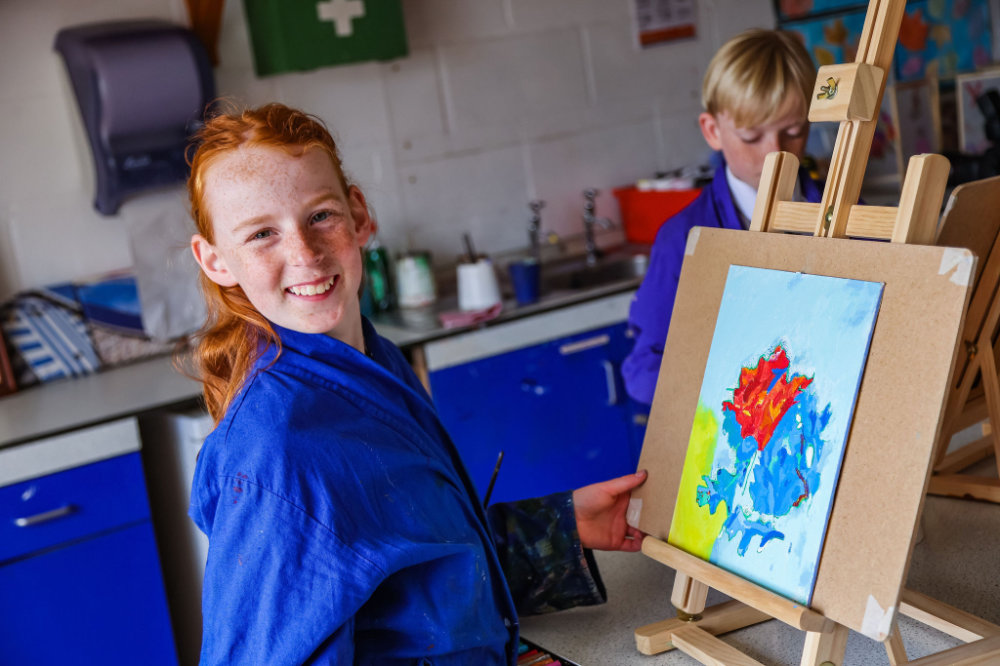We all want our children to have the best experiences possible. In the modern world, when it’s easier than ever for us to stay in our digital bubbles, it can feel tough to find the words to motivate your little ones to get out there and try new things.
At our private school in Devon, we place a lot of importance on building children’s confidence through a range of extracurricular activities and opportunities. We’re also used to children needing that little extra push at the beginning to discover something they go on to love.
Whether it’s trying new foods or joining a sports team, here are some of our favourite techniques for encouraging school children to push their boundaries and try new things.

1. Use their Strengths as a Starting Point
If you want your child to try new things but you’re not sure where to start, this point is really useful. To increase the chances of something new becoming part of their regular life, it’s best to understand what your child already enjoys.
Instead of thinking “What did I do at their age?”, speak to your child to understand their strengths and passions and try new things based on those.
If your child loves listening to music, you could buy them an instrument or join a music club. If your child loves exercise but doesn’t enjoy competition, then a running club might be a more enjoyable social environment for them compared to a competitive sports team.
2. Try Not to Reflect
At some point, almost every parent will push their child into doing something they don’t want to do. This is natural when trying to encourage someone to explore new things.
However, negative experiences can impact children, so being aware of when this might be happening can help ensure new activities are maintained.
As mentioned above, the best way to avoid this is by discussing things with your child before trying something new. By talking to them about their strengths and interests, you can create an environment where they want to try something new for themselves, not just because their parents or carers told them to. This way, the new hobby or routine is much more likely to stick.

3. Do it Together
Young children are always receptive to how their parents or guardians feel or react. Encouragement is important, but taking part in the challenge of trying something new yourself can be even more powerful.
If it’s possible, trying the new thing at the same time can make it seem more approachable for your child. For example, if you want your little one to try new foods, trying them together and talking about them as a family can help.
If the new thing isn’t something you can all do at the same time – for example, a swimming lesson – children can still take encouragement from just seeing you try something new yourself, such as an exercise class taking place at the same time as their lessons.
4. Adapt from Existing Routines
This particular point is super effective at helping children pick up something new with minimal fuss.
Routines are great for everyone, but especially children; they have been proved to make us feel more comfortable. So, if you want your child to attempt something new, try to make it fit seamlessly into existing routines as much as possible.
For example, if your child likes drawing in their room and wants to start painting, turn the period when they enjoy drawing into a time dedicated to learning how to paint. Doing this could make their love of art grow more effectively than, say, forcing them into an after-school art club if they don’t enjoy that environment.

5. Add Incremental Rewards
Whenever your child is pushing their boundaries, it’s a great idea to reflect on their progress frequently.
Often, the best way to approach doing something new is in small steps. If you want your child to join a sports team, allowing them to pick a sport and then practise on their own, and maybe even watch a training session before joining in, can be more conducive to playing long-term than simply being dropped off at the next session.
A good technique, particularly when joining clubs, can be to celebrate the nervous first session regardless of how well it went – it’s a positive step to have joined in the first place – and then commit to a few more. After those first few sessions, you can discuss whether they enjoy it or whether something else might be better.
6. Use Accepting Language
As we’ve discussed, encouragement is great when a child is trying something new. However, the way you encourage can also be really important.
Sometimes, when encouraging children to try new things, we can mistakenly invalidate their feelings. Try not to dismiss any concerns your child might have with phrases like “It’s not scary once you’re used to it.” Instead, acknowledge that they will be anxious and use the other points mentioned above.
For example, if your child is scared by the thought of a swimming lesson, show that you understand their worries: “Everyone is scared at the beginning, but the teachers will help you.” You can then suggest a reward for going the first time, then for swimming a length and so on.
If they’re still worried, you can either re-assess whether it’s the right thing for them or try even smaller steps – such as visiting the pool together and walking through the shallow end – to work towards that first lesson.
Ultimately, new activities can be nerve-wracking for all of us at the start, but with the right techniques and an encouraging attitude, children can get the confidence to try a whole swathe of new things.








